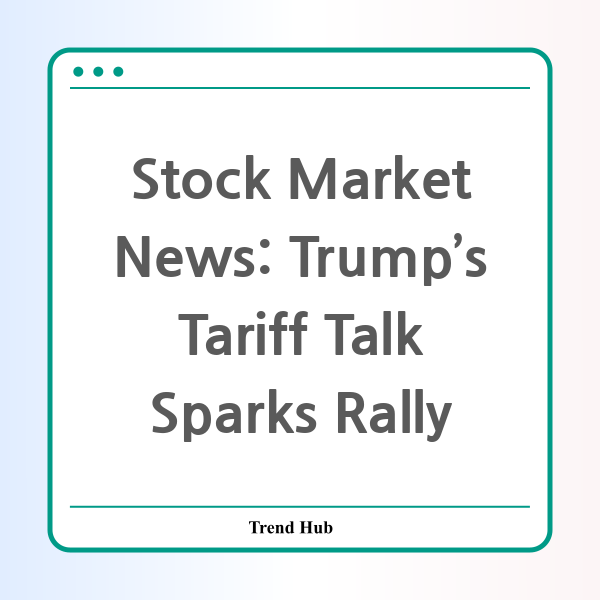* This website participates in the Amazon Affiliate Program and earns from qualifying purchases.

Are you feeling uncertain about the stock market amid ongoing tariff talks? You're not alone. Recent developments are bringing some clarity and optimism back to Wall Street.
This past Monday, U.S. stocks experienced a significant rally, fueled by reports suggesting that President Donald Trump’s upcoming tariffs may not be as sweeping or severe as initially feared. Many investors were relieved to learn that the tariffs could potentially be more targeted, leading to a surge in market confidence.
The Dow Jones Industrial Average closed higher by 598 points, representing a 1.42% gain. Meanwhile, the S&P 500 rose by 1.76%, and the Nasdaq Composite jumped by 2.27%. This positive market movement is attributed to Trump’s recent hints at more flexible tariff measures during a Cabinet meeting.
Historically, Trump has positioned tariffs as a means to protect American businesses. He frequently refers to an upcoming "Liberation Day,” proclaiming that reciprocal tariffs would match foreign countries’ import taxes dollar for dollar. However, the execution of these tariffs has been inconsistent, often leading to confusion and volatility among investors.
In a recent statement, Trump indicated that new tariffs would soon be announced, targeting specific sectors such as lumber and semiconductors. However, there is room for exemptions and a more selective approach than the previous blanket tariffs. This ambiguity in the administration’s strategy has prompted volatility on Wall Street, leaving consumers and businesses alike grappling with uncertainty.
As investment strategists analyze market trends, some suggest that the impact of Trump’s announcements may be more pertinent than traditional technical analysis. Given his remarkable influence on market fluctuations—sometimes causing stocks to surge or plummet with a single remark—the political landscape certainly has the potential to reshape market dynamics dramatically.
For example, markets rallied on the news that Trump hinted at offering potential breaks from reciprocal tariffs. However, it may be too early to assume this upward trend will continue, especially given the unpredictable nature of tariff implementations. Investors should remain cautious as they navigate through these turbulent waters.
As the global economic landscape shifts, other markets are also experiencing fluctuations. For instance, while U.S. stocks have surged, Japan’s market saw a modest increase of about 0.5%. Meanwhile, Hong Kong’s market experienced a decline of over 2%, reflecting the global repercussions of trade policy changes.
Looking ahead, Goldman Sachs has suggested that the current downturn in the S&P 500 could be a blessing in disguise, opening up potential opportunities for rebounds as the market recalibrates. The global economy continues to respond to U.S. tariff strategies, and the ongoing negotiations with countries like the EU, Mexico, and Canada are pivotal in shaping future market conditions.
Furthermore, industries that may be adversely affected by tariffs are voicing concerns. For example, U.S. farmers and global ocean carriers are anticipating damage from proposals intended to impose fines on containerships built in China. With the aim of revitalizing U.S. shipbuilding, there is potential for unintended consequences affecting smaller U.S. ports and businesses reliant on shipping.
In summary, navigating the complexities of stock market news, particularly regarding tariffs, requires staying informed and adaptable. The market’s response to Trump’s tariff strategies highlights the importance of understanding the interplay between political decisions and economic outcomes.
As we continue to observe and respond to these developments, it's essential to stay ahead of the curve. Subscribe to our newsletter for the latest stock market news and expert analysis to make informed investment decisions.
* This website participates in the Amazon Affiliate Program and earns from qualifying purchases.